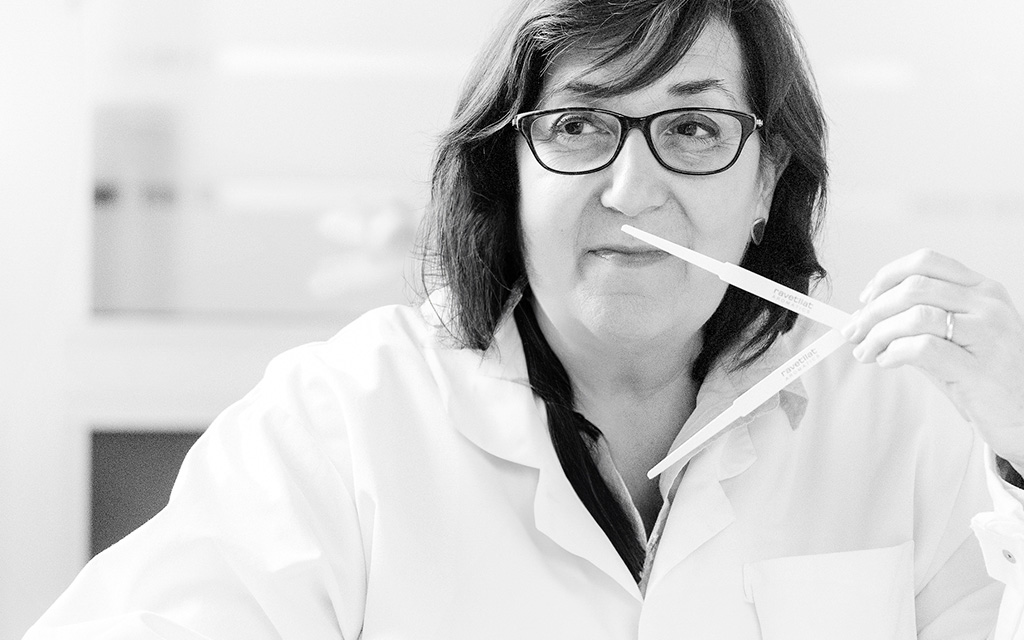
Meet Lourdes Sol, senior perfumer at Ravetllat Aromatics
Discover her fascinating journey into the world of perfumery. From her early childhood memories imbued with Mediterranean scents, to becoming an experienced perfumer at one of the oldest independent fragrance houses in Europe, we’ll uncover the secrets behind the trade and how she has played an instrumental role in the company´s success.
How did your passion for perfumery begin?
My love for perfumery started at a very young age. As a little girl growing up in Barcelona, I remember harvesting Mediterranean aromatic plants from the fields and using them to prepare special concoctions that my family would try out. I was particularly enthused by the smell of flowers in my mother´s garden, the sweet scent of roses and geraniums, the fragrance of thyme, lavender, and rosemary. I was always discovering new scents and exploring how they would combine.
What scents remind you of your childhood?
At home, I fondly remember the aromas that came out of our kitchen, where my mother would prepare local roasted dishes garnished with fried almonds, bay leaves, garlic, and onions.
On holidays, we went to a mountain village in the Pyrenees where we spent a lot of time in nature. Those memories evoke the humid smell of musk, fresh pine, the earthy mushrooms we harvested to prepare meals and the smoky charcoal we used to lighten our fireplace.
I also remember the citric fragrance of Royale Ambree, which was the traditional Eau de Cologne that my entire family used on special occasions. At the time, it was common for all members of a family to use the same fragrance, and I think that helped create a special bond and foster a feeling of belonging.
At what point did your interest in perfumery turn into a profession?
I grew up in San Andreu, on the outskirts of Barcelona, where the original Ravetllat Aromatics headquarters were located. It was a well-known family business that had been around for generations -since the early 30s- and we all knew the Ravetllat family. From my house I could smell the myriad of fragrances that came out of the factory’s premises and that always attracted me.
Soon after getting my chemistry degree, I started working at Ravetllat Aromatics, alongside Ernesto Ravetllat, the father of our current CEO Silvia Ravetllat. It was him who taught me the ins and outs of the trade, which at the time required a lot of self-learning, creativity, and perseverance.
I remember how far Mr Ernesto went to obtain special editions of technical perfumery books that came from France and were very hard to get back then. That was perhaps the greatest teaching I got from him: that it is only through passion and perseverance that one can build something meaningful.
How has the job of a perfumer changed over the years?
When I started working at Ravetllat Aromatics 45 years ago, both the company and the industry were at early stages of development.
Inside the company, the role of the perfumer was much broader and required a larger variety of skills ranging from basic laboratory functions to complex formulation, to providing technical support to clients in the manufacturing process.
The technical equipment available back then was much less sophisticated and precise than it is today. We compensated by developing a sharper olfactive memory and being more creative and flexible in the areas of formulation.
Certainly, technological advances have given perfumers today a whole new range of tools and analytical power that was unthinkable in the day. Now we have access to much more data, far better tools, and a much wider range of raw materials. However, we should not forget the good old ways, as the intuition and creativity we were forced to develop back then are essential assets for a perfumer.
Do you consider perfumery more of an art or a science?
I believe it is a unique blend of both. The artistic side is crucial as a perfumer’s greatest skill is creativity: the ability to combine ingredients harmoniously and bring unique olfactory experiences to life.
On the flipside, science plays a critical role in the creative process as it gives us the practical and analytical tools to innovate and find new solutions to the same old problems. It is thanks to scientific advances that we have discovered a whole array of new molecules that open a world of possibilities in formulation and application.
In present times, ever-evolving regulation is driving a new sort of creativity in the world of perfumery. Perfumers now have the dual challenge of continuing to innovate while meeting increasingly rigorous technical and regulatory standards. This dilemma brings about once again the idea that perfumery is both an art and a science.
Now more than ever, perfumers need to be extremely technically able while at the same time remaining artists at heart.